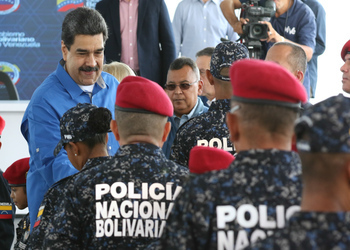A government-reported decline in Venezuela’s crime rate may create the illusion of a security breakthrough, but the reduction has more to do with reconfigurations in the country’s underworld than an effective state response.
In mid-May, Venezuelan security officials announced that crime indicators had fallen by 25.1% compared to 2023.
The Venezuelan government attributes the decrease to large-scale operations conducted by security forces against criminal groups.
President Nicolás Maduro also touted a similar theory in December 2023, saying “the country is seeing the best results in over 20 years in terms of citizen security, peace, and the protection of the people.”
SEE ALSO: In Zulia, Venezuela, Not Even Schools Escape Extortion
The announcements coincide with figures from the Venezuelan Violence Observatory (Observatorio Venezolano de Violencia – OVV), an organization that studies insecurity and violence at the national level. The OVV also recorded a decrease in violent deaths compared to 2022 and 2023.
But while the government highlights the role of the armed forces, there may be more complex reasons behind the drop-off in crime.
Below, InSight Crime explores key factors driving the apparent drop in crime in Venezuela – a country once considered the most dangerous in Latin America.
Mass Criminal Migration
Aside from large-scale security operations, the OVV’s most recent violence report draws a link between the migration of criminal groups and a reduction in crime.
Venezuela’s ongoing economic crisis has squeezed both ordinary citizens and the country’s criminal groups. Economic decline in the labor and commercial sectors has left businesses and citizens unable to pay criminal groups, reducing opportunities for extortion and ransom kidnappings.
“Crime is falling in Venezuela because of the destruction of the country’s economy…because of the loss of opportunities for crime,” OVV director, Roberto Briceño-León, told InSight Crime.
Recession in Venezuela has led criminal gangs like the Tren de Aragua, Yeico Masacre, and The Meleán to infiltrate Venezuelan diasporas settled in other Latin American countries.
These gangs – especially the Tren de Aragua – have exploited the vulnerability of migrants and a lack of regional cooperation between authorities to expand criminal operations abroad. In Chile, Colombia, and Peru, the expansion of these organizations has led to spikes in violence and crime.
Monopolizing Violence
The territorial and criminal hegemony enjoyed by some non-state armed groups has created a false sense of security in some regions. The OVV report also points to pacts between the government and some criminal groups, in addition to the monopolization of violence in some regions, as contributing factors to improved security perceptions.
For instance, the National Liberation Army (ELN) – a Colombian guerrilla group with operations in Venezuela – gained a monopoly on extortion in the Apure state, bordering Colombia, after receiving preferential treatment from the Maduro government.
SEE ALSO: Venezuela Security Policy: Armed Groups and Electoral Interference
The ELN helped the Venezuelan army expel a faction of Colombia’s ex-FARC mafia – a rival group – from the Apure state in 2022, reducing competition for extortion rackets and social control.
“People may start to feel safer when they can pay one bandit instead of three. They pay one big bandit and the big bandit protects them,” Briceño-León said.
But though the ELN’s territorial control may appear to improve security, locals are still subjected to rigorous social rules, the imposition of illegal taxes, and restrictions on their mobility. Failure to comply with these rules carries severe punishments.
“At times Guasdualito [a settlement in Apure] seems like the safest town in the country because it is controlled by the guerrillas,” a cattle rancher who requested anonymity for security reasons told InSight Crime.
Controlling the Narrative
Despite the Venezuelan government’s efforts to promote the drop-off in crime, the absence of official reports makes it impossible to verify the data.
In addition to lacking documentary support, some statements on the reduction in crime have been inconsistent. The most recent figures show a 25% reduction in crime, but, in early May, Ceballos reported a 24% decrease. In December 2023, a 16% drop was reported.
In 2015, Venezuelan authorities stopped publishing official data on national and regional security, including data on homicides, extortion, and kidnappings.
Instead, the task of collecting statistics and disseminating this information has fallen on the media and NGOs, including the OVV. However, organizations or media outlets failing to tow the government’s line risk facing persecution.
Aside from closures of non-state media and harassment of journalists, the Maduro government is also close to approving a law that would grant it greater control over NGOs.
With elections looming in Venezuela, security has become a key instrument for boosting the Maduro government’s little remaining popularity.
Featured image: President Maduro greets Venezuelan police officers during an official event. Credit: Venezuelan government.

